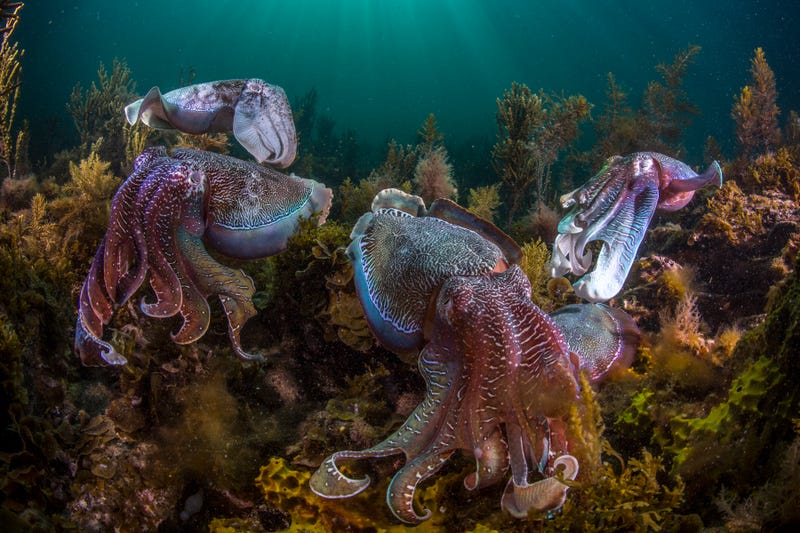
Something strange is happening to the oceans. As coral reefs wither and fisheries collapse, octopuses are multiplying like mad. As soon as they perceive weakness, they will amass an army and invade the land, too.
Okay, that last statement is probably pure paranoia. But it is a bit unsettling that cephalopods—squids, octopuses, cuttlefish—are booming, and scientists don’t know why. An analysis published today in Current Biology indicates that numerous species across the world’s oceans have increased in numbers since the 1950s.
“The consistency was the biggest surprise,” said lead study author Zoë Doubleday of the University of Adelaide. “Cephalopods are notoriously variable, and population abundance can fluctuate wildly, both within and among species.”
“Cephalopods tend to boom and bust—they’re called the weeds of the sea”
It was one such wild fluctuation that inspired the new study. A few years back, the giant Australian cuttlefish, pictured above, experienced a sudden and dramatic population crash. “They almost disappeared completely,” Doubleday told Gizmodo, adding that one of her co-authors had the idea to look at boom-bust cycles across other cephalopod populations to see if there were any patterns. “We didn’t know how much data would be out there, but we managed to get quite a bit together,” Doubleday said.
Pulling together fishery data and previous scientific surveys, the team managed to assemble a time series of population information on 35 species or genera of cephalopods, spanning all major ocean regions from 1953 to 2013. While there was substantial year-to-year variability, and a small number of species declined, overall, many cephalopod populations in many parts of the ocean have increased in numbers. (The giant Australian cuttlefish has also begun to recover.)
So, why are cephalopods kicking butt when pretty much everything else in the oceans is dying? Doubleday and her co-authors are still investigating, but they suspect it has to do with rapid population turnover rates. “Cephalopods tend to boom and bust—they’re called the weeds of the sea,” Doubleday said. “If environmental conditions are good, they can rapidly exploit those conditions because they grow so fast.”
One reason environmental conditions might have improved is that humans are picking off cephalopods’ main competitors—predatory fish. Other large-scale changes like global warming could also be playing a role. “I don’t think it’s any one single factor,” Doubleday said. “But something’s changing on quite a large scale that’s giving cephalopods an edge.”
“Something’s changing on quite a large scale that’s giving cephalopods an edge.”
As the oceans continue to change, the long-term fate of all marine organisms remains uncertain. For instance, early laboratory evidence suggests that ocean acidification might impair the development of some cephalopods. And as squid and octopuses become a larger part of human diets, we’re harvesting more cephalopods from the sea than ever before.
Another strange possibility is that cephalopods will become too weedy and run out of food. If that happens? “They’re highly cannibalistic—they might start eating each other if they overgrow,” Doubleday said.
In short, it’s too early to predict whether octopuses will continue to boom or whether the oceans will devolve into a frenzied cannibalism fest. Still, if an intelligent race of tentacled underwater beings winds up outmaneuvering us and taking over the planet, we can’t say there weren’t warning signs.
Maddie Stone@themadstone
Maddie is a staff writer at Gizmodo